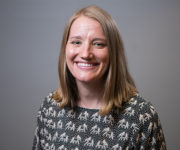Meet the Match
A Rugby Coach and Sports Psychologist Dreams Big for Girls
In Venezuela, as in most of the world, sport is traditionally seen as a space where men dominate. In Claudia Contreras’ childhood home in Caracas, the reality was quite the opposite.
From the time she was a little girl, Claudia swam, ran, played volleyball and basketball, climbed mountains, and challenged her younger brother in to see who was the most athletic of the Contreras children.
“The funny thing is that I am better than my brother in sports,” Claudia laughs. “The stereotype is that boys are supposed to be stronger and faster. Sports is for them. But, that wasn’t the case in my family.”
In 2003, while studying for her bachelor’s degree in sports psychology at Andrés Bello Catholic University, Claudia was first exposed to rugby, the sport in which she would find her fullest expression. She soon worked her way to being named captain of the university’s women’s rugby team. By 2012, she was captain of the Venezuelan national team, leading her country to strong performances at the Bolivarian Games (2013), Central American and Caribbean Games (2014), and the South America Women’s Sevens championship (2016). Last year, the team competed in the Women’s Rugby Olympic Repechage in Dublin, Ireland—Venezuelan rugby’s most important competition to date.
Throughout the years, Claudia balanced her rugby career with work as a sports psychologist for several clubs in different sports. Since 2013, she has also coached the women’s rugby team at her university, and earned several certifications from World Rugby, the sport’s international governing body. Yet, despite the country’s progress in rugby, and Claudia’s personal athletic success, the stereotypes of women’s ability to compete remain as stark to Claudia as they did when she was a girl.
“In Venezuela, people think rugby is for men and ballet dancing is for women,” Claudia says. “I had an Argentine coach on the national team—and you know Argentina is one of the best in the world—and he confessed to me that he didn’t think rugby was for women. I was like, ‘What?! You’re our trainer—you can’t think that!”
The coach later left for a position in Europe and reconsidered his view on women in rugby. He thanked Claudia for the role she played in changing his mind.
In 2013, Claudia and a group of close colleagues launched Deporte para el Desarrollo (Sport for Development), an NGO that provides sports opportunities to youth and coaches in Venezuela’s most disadvantaged communities. The organization consists of 14 team members, including sociologists, psychologists, anthropologists, who apply the best in international sport development to Venezuela’s context. As of 2017, Claudia and her organization have worked with more than 400 trainers across the country, positively impacting more than 12,000 children and youth.
“Sport is a great space for children to learn because they want to be there,” Claudia says. “We create a methodology for coaches to teach social skills, because we know not every child is going to be a high-performance athlete, but every child has a to be a good citizen. We’re developing human beings.”
Venezuela faces serious economic and social challenges. In 2016, the country had the second-highest murder rate in the world. According to World Bank statistics, poverty has trended upward for the past five years, bringing with it food shortages, malnutrition, and a significant increase in child mortality rates. Claudia has experienced the realities firsthand, and her organization began providing meals for children participating in sports activities after many arrived too unhealthy for physical activity.
With increasing tensions and divisions, Claudia believes in the power of sport to include and empower people. Part of the reason she continues to coach women’s rugby teams (as well as a boy’s under-18 team), is the sport’s ability to draw fans and players across social strata and education levels.
“Rugby is a physical sport,” Claudia says. “But you don’t play to injure anyone. We’re there because we love the sport. It teaches you about tolerance and respect for your opponent and the referee—that’s what makes a community. If I can make it visible that girls are interested in rugby, and society sees girls on the fields, then they can start to believe that girls can be leaders, too.”
As she joined the U.S. Department of State and espnW Global Sports Mentoring Program, Claudia brought a diversity of talents and ideas for how to create sport-based social change across Venezuela. She is mentored by Katherine Montiel, director of public relations and communications for Gatorade. As a leader within one of the world’s most prominent sports brands, she provides Claudia with important marketing, public relations, partnership development, and fundraising resources. With a history of supporting youth and community development through programs such as Gatorade Play It Forward, Katherine and her Gatorade team connect directly with Claudia’s mission and support her to make a lasting difference in the lives of youth and women in Venezuela.

